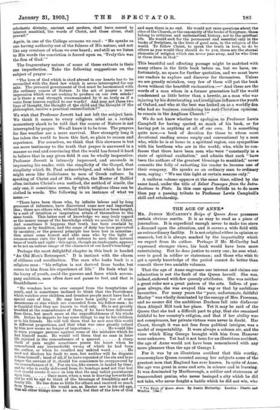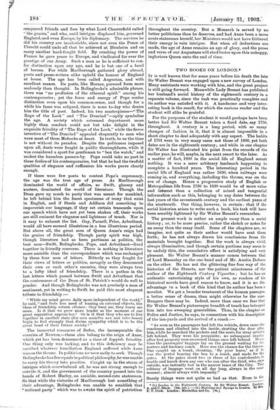THE AGE OF ANNE.* Mn. JUSTIN MCCARTHY'S Reign of Queen
Anne possesses certain obvious merits. It is as easy to read as a piece Of journalism. It is superficial enough never to make too stern a demand upon the attention, and it covers a wide field with an extraordinary facility. It is not original either in opinion or research, but it is always marked by the impartiality which we expect from its author. Perhaps if Mr. McCarthy bad expressed stronger views, his book would have been MOM entertaining. But he does justice to every one; he sees what- ever is good in soldier or statesman; and those Who wish ti) get a speedy knowledge of the period cannot do better than consult these two amiable -volumes.
That the age of Anne engrosses our interest and claims our admiration is not the fault of the Queen herself. She was, indeed, endowed with few queenly attributes. She was neither a great ruler nor a great patron of the arts. Infirm of pur- pose always, she was swayed this way or that by ambitious favourites. For many years the "poor, unfortunate, faithful Morley" was wholly dominated by the energy of Mrs. Freeman, and no sooner did the ambitious Duchess fall into disfavour than Abigail Hill took her place. Yet it may be said of the Queen that she had a difficult part to play, that she remained faithful to her country's religion, and that if her ability was not conspicuous, her private virtues were never in doubt. Her Court, though it was not free from political intrigue, was a model of respectability. It wore always a solemn air, and the vices which King George brought with him from Hanover were unknown. Yet had it not been for an illustrious accident, the age of Anne would not have been remembered with any more pleasure than the age of George L For it was by an illustrious accident that this worthy, commonplace Queen counted among her subjects some of the greatest men that England has ever known. In spite of Anne, the age was great in arms and arts, in science and in learning. It was dominated by Marlborough, a soldier and statesman of transcendent genius, who never besieged a city which he did not take, who never fought a battle which he did not win, who
tall other things come to an end, but that of the love of God .wei %gale Queen Anne. By Justin McCarthy. London : Chatto and
conquered friends and foes by what Lord Chesterfield called "the graces," land who, until intrigue displaced him, governed England; and even Europe, by his diplomacy: The services he did 'his country are incalculable, since not even the Peace of Utrecht could undo all that be achieved at Blenheim and on many another bard-fought field. By crushing the power of France he gave peace to Europe, and vindicated for ever the prestige of our Army. Such a man as he is sufficient to con- fer _distinction upon any age, and he is but one of a band of heroes. For while Marlborough gathered glory abroad, poets and prose-writers alike upheld the honour of England at , home. The age has been called Augustan, and with excellent reason. Its poets, like Horace, pursued form more zealously than thought. In Bolingbroke's admirable phrase, there was "no profusion of the ethereal spirit" among his contemporaries; yet the force and energy of Pope confer distinction even upon his common-sense, and though for a while his fame was eclipsed, there is none to-day who denies him the title of poet. Indeed, his two masterpieces—" The Rape of the Lock" and "The Dunciad "—aptly symbolise the age. A society which esteemed deportment more highly than conduct could not but take delight in the exquisite frivolity of "The Rape of the Lock," while the fierce inieetive of "The Dunciad" appealed eloquently to men who were most of them Mohocks at heart. In truth, to us the time is not without its paradox. Despite the politeness imposed upon all, duels were fought in public thoroughfares, while it was _considered a sport for gentlemen to "box the watch," and molestthe harmless passers-by. Pope could take no part in these frolics of his contemporaries, but that he had the twofold clhalities of elegance and ruffianism his works prove clearly enough.
If there were few poets to contest Pope's supremacy, the age was the true age of prose. As Marlborough 'dominated the world of affairs, so Swift, gloomy and 'austere, dominated the world of literature. Though the Dean•gave up much to party that was meant for mankind, he left behind him the finest specimens of irony that exist in English, and if Steele and Addison did something to impoverish our language,- if they set certain trammels upon our speech which have not yet been shaken off, their works are still eminent for elegance and lightness of touch. Nor is it easy to exhaust the list. Gay, Parnell, Prior, Arbuthnot, would all have seemed illustrious in a less illustrious period. But above all, the great men of Queen Anne's reign had the genius of friendship. Though party spirit was high, though literature had as keen partisans as politics, the best men—Swift, Bolingbroke, Pope, and Arbuthnot—lived together in friendly converse. There is nothing in literature more amiable than the correspondence which was exchanged by these four men of letters. Bitterly as they fought for their views of letters or politics, savagely as they denounced _their own or each other's enemies, they were always true to a lofty ideal of friendship. There is a pathos in the last letters which passed between Swift and Arbuthnot that the contemners of the Dean of St. Patrick's would do well to _ponder. And though Bolingbroke was not precisely a man of *sentiment, yet in writing to Swift he paid this most eloquent tribute to friendship
" While my mind grows daily more independent of the world," he said, "and feels less need of leaning on external objects, the ideas of friendship return oftener: they busy me, they warm me more. Is it that we grow more tender as the moment of our great separation approaches ? Or is it that they who are to live together in another state (for vera amicitia non nisi inter bonos) begin to feel strongly that divine sympathy which is to be the great bond of their future society ? "
The immortal romances of Defoe, the incomparable die- . coveries of Newton,—these also belong to the reign of Anne, which yet has been denounced as a time of foppish frivolity.
One thing only was lacking, and to this deficiency may be ascribed whatever humiliation England suffered while Anne • was on the throne. In politicians we were sadly to seek. Though Bolingbroke has few equals in political philosophy, he was unable to carry his theory into practice. Caught up in the storm of intrigue which overwhelmed all, he was not strong enough to outride it, and the government of the country passed into the hands of Robert Harley, an amiable, second-rate statesman. So that while the victories of Marlborough lost something of , their advantage, Bolingbroke was unable to establish that "national party" which was to awake the spirit of patriotism throughout the country. But a Monarch is served by no better politicians than he deserves, and had Anne been a more acute statesman herself, her Ministers would not have frittered their energy in vain intrigue. But when all deductions are made, the age of Anne remains an age of glory, and the prose and verse of our Augustans will shed lustre upon this unhappy, inglorious Queen unto the end of time.























































 Previous page
Previous page